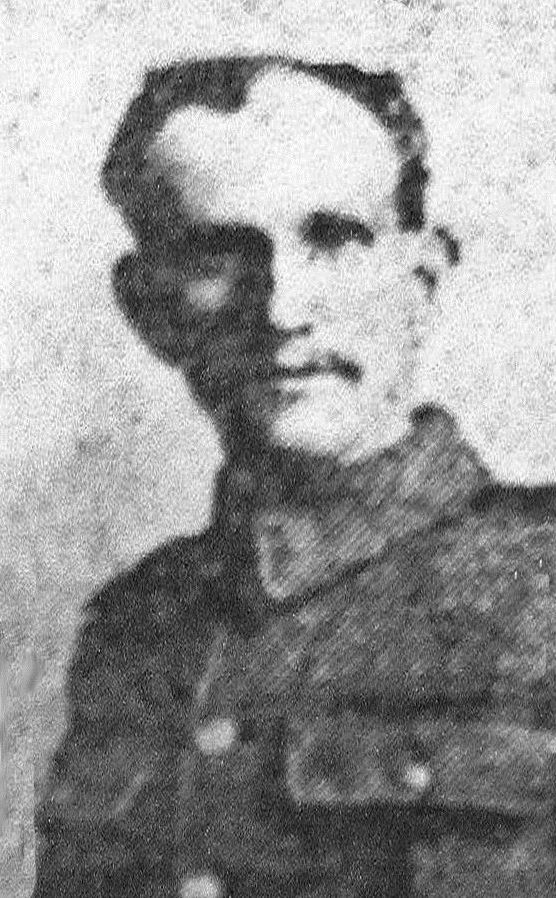Pte
John Trobe
Information about birth
|
Date of birth: 26/06/1882 |
|
Place of birth: Shilbottle, Northumberland, England, United Kingdom |
General information
|
Profession: Stonemason |
Army information
|
Country: England, United Kingdom |
|
Force: British Expeditionary Force |
|
Rank: Private |
|
Service number: 33597 |
|
Enlistment date: 07/06/1916 |
|
Enlistment place: Alnwick, Northumberland, England, United Kingdom |
|
Units: — York & Lancaster Regiment 1/4th Bn. (Hallamshire) (Last known unit) |
Information about death
|
Date of death: 19/10/1917 |
|
Place of death: No. 3 Australian Casualty Clearing Station, Nine Elms, Poperinge, Belgium |
|
Cause of death: Died of wounds (D.O.W.) |
|
Age: 35 |
Cemetery
|
Nine Elms British Cemetery Plot: VI Row: F Grave: 19 |
Distinctions and medals 2
|
British War Medal Medal |
|
Victory Medal Medal |
Points of interest 3
| #1 | Place of birth | ||
| #2 | Enlistment place | ||
| #3 | Place of death (approximate) |
My story
John Trobe was born in Shilbottle, Northumberland in 1882. He married Catherine Hutchinson in 1904. They had six children together. John was drafted in the army on the 1st of March 1917 at Alnwick for the duration of the war. He was embedded with the 3rd Northumberland Fusiliers. His occupation on his Service Record was “Shifter” – someone who repairs the horse-ways and other passages in the mine, and keeps them free from obstructions. At this time, he lived with his family in Acklington, Northumberland.
The 27th of August 1917 was John’s last day on English soil, as he embarked for France. Upon his arrival he was transferred to the 4th (Hallamshire) Battalion of the York & Lancaster Regiment. After training in northern France John’s Battalion arrived in Flanders on the 4th of October 1917. The 4th York & Lancs advanced towards Passchendaele on 9 October 1917. John wrote a letter home saying “we had a very hot time of it being under a heavy fire of machine guns and shells and had some very difficult ground to go over. But there was (no) stopping the Y&Ls”.
On 16 October the men were packed into motor lorries and brought back to Ypres, from where they marched to their camp at Potijze. The camp had to be set up during the day because no lights or fires were allowed after dusk so they wouldn’t be spotted by German aeroplanes.
On 18 October 1917 at 11 o’clock the Battalion was packing its things to march off at noon. The men were lying about, smoking or writing letters, when a number of bombs dropped from two German aeroplanes fell among the men. The attack came without the slightest warning and in just a few seconds fifty men were killed and wounded.
Private John Trobe, aged 35, was among the casualties. A telegram sent on the 19th of October mentions that he had suffered wounds to his hands, legs, and suffered a compound fracture of his tibia and feet. He was evacuated to No. 3 Australian Casualty Clearing Station in Poperinge, where he succumbed to his wounds on 19 October 1917. John was buried in the adjacent Nine Elms British Cemetery.
The 27th of August 1917 was John’s last day on English soil, as he embarked for France. Upon his arrival he was transferred to the 4th (Hallamshire) Battalion of the York & Lancaster Regiment. After training in northern France John’s Battalion arrived in Flanders on the 4th of October 1917. The 4th York & Lancs advanced towards Passchendaele on 9 October 1917. John wrote a letter home saying “we had a very hot time of it being under a heavy fire of machine guns and shells and had some very difficult ground to go over. But there was (no) stopping the Y&Ls”.
On 16 October the men were packed into motor lorries and brought back to Ypres, from where they marched to their camp at Potijze. The camp had to be set up during the day because no lights or fires were allowed after dusk so they wouldn’t be spotted by German aeroplanes.
On 18 October 1917 at 11 o’clock the Battalion was packing its things to march off at noon. The men were lying about, smoking or writing letters, when a number of bombs dropped from two German aeroplanes fell among the men. The attack came without the slightest warning and in just a few seconds fifty men were killed and wounded.
Private John Trobe, aged 35, was among the casualties. A telegram sent on the 19th of October mentions that he had suffered wounds to his hands, legs, and suffered a compound fracture of his tibia and feet. He was evacuated to No. 3 Australian Casualty Clearing Station in Poperinge, where he succumbed to his wounds on 19 October 1917. John was buried in the adjacent Nine Elms British Cemetery.
Sources 5
|
Ancestry https://www.ancestry.co.uk/ Sources used |
|
CWGC https://www.cwgc.org/find-war-dead/casualty/137615/trobe,-/ Sources used |
|
Grant, D.P., "The 1/4th (Hallamshire) Battalion, York and Lancaster Regiment, 1914-1919", Londen, The Arden Press, 89-90. Sources used |
|
Long Long Trail https://www.longlongtrail.co.uk/?domain=www.1914-1918.net Sources used |
|
Wright, M., "John “Jack” Trobe (1882 to 1917) A Man from Newton-on-the-Moor", 2016. Sources used |
